Dieting to shed pounds is fine, but the benefits of eating healthy go way beyond weight loss.
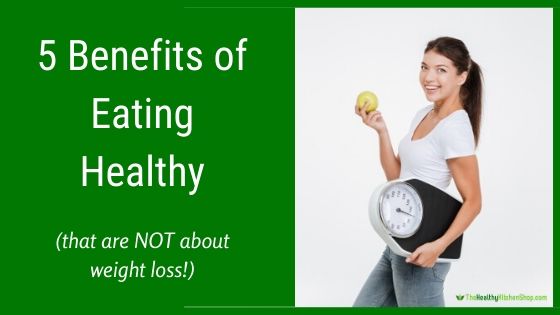
The vast majority of us become interested in eating healthier for one reason – weight loss. It’s a very valid concern. Unless you’ve been living under a rock you know that obesity is rampant in the U.S. Most everyone also already knows that weight control is extremely important to overall health.
However, whether slimming up is a concern for you or not, there are many other benefits of eating healthy. Even better news is that while weight loss can often be a very slow process, a healthier diet can produce other positive effects much sooner. Here are just a few improvements you can expect when you make healthier food choices.
1. Boost Your Energy Level
Far too often we feel sluggish and turn to quick fixes such as caffeine, energy drinks, or junk food from the vending machine. The result is an immediate but very short improvement, and then a big crash.
Eating a healthier diet helps keep your body on a more even keel. Snacking on foods such as yogurt or hummus can provide a great energy boost, but you’ll get better and more consistent results with an overall strategy.
Some suggestions from WebMD include:
- Oatmeal – a complex carbohydrate that is slow to digest and helps provide more lasting energy
- Beans – protein that’s high in fiber, which slows digestion, and magnesium content helps your body make energy
- Walnuts – rich in omega-3s used for energy, healthy fats to satisfy hunger, and fiber to slow digestion
For the complete list plus lots more healthy eating info, see Foods That Boost Your Energy at WebMD.com
Another helpful article is Feast On These High-Energy Foods from Prevention.com. It’s all about balance. For most of us, making better choices in what we eat, how much and how often will result in increased energy even sooner than we might expect.
2. Improve your Mood
The way your body feels has a direct impact on your mood. An obvious example is that when you have a backache or a head cold your outlook on life tends to be less cheerful.
On the flip side of that, it only makes sense that when you have more physical energy, you feel better in general. You aren’t as stressed, problems don’t seem so difficult and life not quite so overwhelming.
According to WebMd, “There is evidence that changing your diet can change your metabolism and brain chemistry, ultimately affecting your energy level and mood.” When you eat the foods that make your body feel better, you’ll improve your emotional well-being at the same time.
The medical community was slow to recognize the food-mood connection, but today, findings from the field of nutritional psychiatry leave no doubt about the connections between what we eat and how we feel. So, if we want to improve our mood, what exactly should we be eating?
Let’s start with what not to eat…

The classic donut, topped with chocolate icing and colored sprinkles – concentrated sugar in every bite!
The main offenders are the two evil staples of the typical western diet – processed foods and sugar. It’s been said that 80% of what’s on our grocery store shelves today didn’t exist 100 years ago. Avoid all that junk and eat healthier by focusing on a diet with:
- lots of vegetables, fruits, and unprocessed grains
- healthy fish and seafood
- limited amounts of lean meats and dairy
Want to prove it to yourself? The article Nutritional psychiatry: Your brain on food suggests a “clean eating” plan you can try for a few weeks. You may be shocked at how much better you feel.
3. Reinforce Your Immune System
An apple a day might be a start, but eating a healthier diet overall can help increase your natural defenses. Proper nutrition gives your body the good bacteria it needs to kill germs in the intestinal tract, make wounds heal faster, fight infection and make you less likely to catch colds, and even rid the body of invading viruses. Foods with antioxidants can help protect your cells from the damage caused by free radicals.
Taking megadoses of vitamins is never a good idea (more isn’t always better), and you can’t rely on drug store pills that claim to “boost” immunity. In fact, members of the scientific community are quick to point out that the immune system is exactly that, a system, and it’s extremely complex.
The best explanation I’ve read is in “The China Study” by T. Colin Campbell. The author’s conclusion is that most supplements are a waste of time for the sole reason that it isn’t that simple. He explains that at all times, all of the organs of the body are working together in a complicated action/reaction process. Because of that, a pill packed with nutrients might sound like a good idea, but the body doesn’t even recognize it as food.
That is not to say that all supplements are worthless, just that you can’t get all your nutrition from pills. There’s a huge difference when you eat a healthy, balanced diet because those nutrients are delivered to the body in a way that they can be absorbed and used effectively.
That is my unscientific interpretation, but if you’d like to get it straight from the source the book is available on Amazon here: The China Study: The Most Comprehensive Study of Nutrition Ever Conducted and the Startling Implications for Diet, Weight Loss and Long-term Health
As always I go back to plain ole common sense, and you’ve got to figure that the best way to help your immune system work better is to provide it with the best tools possible – good, nutritious food!
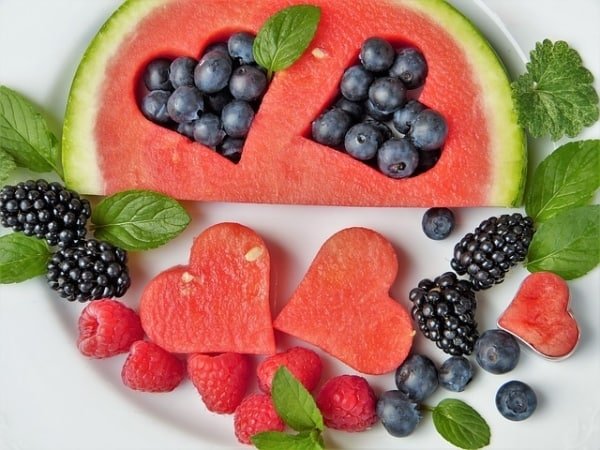
4. Prevent Disease
The list of conditions affected by diet is endless: heart disease, strokes, osteoporosis, certain cancers, on and on. You know the common treatments for dread diseases, and they aren’t pleasant, nor are they always successful.
A very high percentage of the American population suffers from high cholesterol, high blood pressure, Type II Diabetes, and many other chronic diseases and conditions. Fortunately, there are lots of drugs available that work well for treatment or control. Unfortunately, they all have side effects, which can cause other problems that then have to be treated with yet more drugs, with yet more side effects. It’s a vicious cycle.
When you’re young it’s easy to fall into the trap of thinking you’re invincible and will never have to deal with any serious health issues. As you age you begin to realize we’re all susceptible. Heredity, environment and other factors play a role too, but the one thing we can control is diet. Given the choice, would you rather go through the process of one of those cures, or make some dietary changes that will make you feel better now and could save you from something worse later on?
If that sounds like some dreaded sacrifice, let’s go back to energy and mood. In recent years there was an Australian study on how increased consumption of fruits and vegetables affects happiness and well-being. It reached the following conclusion:
“People’s motivation to eat healthy food is weakened by the fact that physical health benefits accrue decades later, but well-being improvements from increased consumption of fruit and vegetables are closer to immediate.”
Sounds like a win-win, right?!

5. Increase Longevity and Life Quality
When you live on junk food, you’re making your body work harder to try to find and squeeze out the nutrients it needs. Common sense tells you that the smartest choice is to give your body the best fuel you can, and there are studies to back that up. Here in the U.S., Seventh Day Adventists who eat vegetarian diets have a life expectancy of 4-7 years longer than the rest of us. For some more examples see the article Eating for Longevity.
Of course, living a long time won’t be that great if it means dealing with severe physical or mental impairment of one form or another. Food can be your best friend in that arena too.
In addition to all of the above mentioned benefits, a healthy diet helps prevent loss of bone mass and muscle strength. It gives your body the vitamins and minerals it needs to create normal chemical reactions and make all your organs function properly. It helps keep you vital and mobile and mentally alert. An added bonus is that it saves you money. Do you want to spend your retirement savings on medical bills or on all those things you’ve dreamed of doing in your Golden Years?
If you want more details and proof of how diet relates to longevity, an excellent book is Healthy at 100: The Scientifically Proven Secrets of the World’s Healthiest and Longest-Lived Peoples, by John Robbins. (Click link to see this book on Amazon.)
There Are Lots More Benefits of Eating Healthy
If you need any more reasons to clean up your dietary act, just remember that eating healthy benefits everything from your skin cells to your brain matter. You can eat healthier foods to lose weight, to have silkier hair or nicer nails, to set a good example for your kids, or just because it’s all the rage.
Start eating healthier for any reason or no reason. You’ll look better, feel better, and live longer, and you might realize some of those benefits sooner than you expect!
You may also like…
- Healthy Food Substitutions: 10 Smart Swaps to Transform Your Diet
- Healthy Snack Bar Recipes
- Healthy Snack Ideas for Work – What to Eat, When and Why
- The 10 Best Healthy Cookbooks – Better For You & Delicious Too!
- Keep Your Microwave – Just Don’t Nuke These Foods
- Portion Control for Eating Healthy
- Top 10 Apps for Eating Healthy
- What is a Flexitarian Diet?
If you found this info helpful please share on Pinterest and help us spread the word!
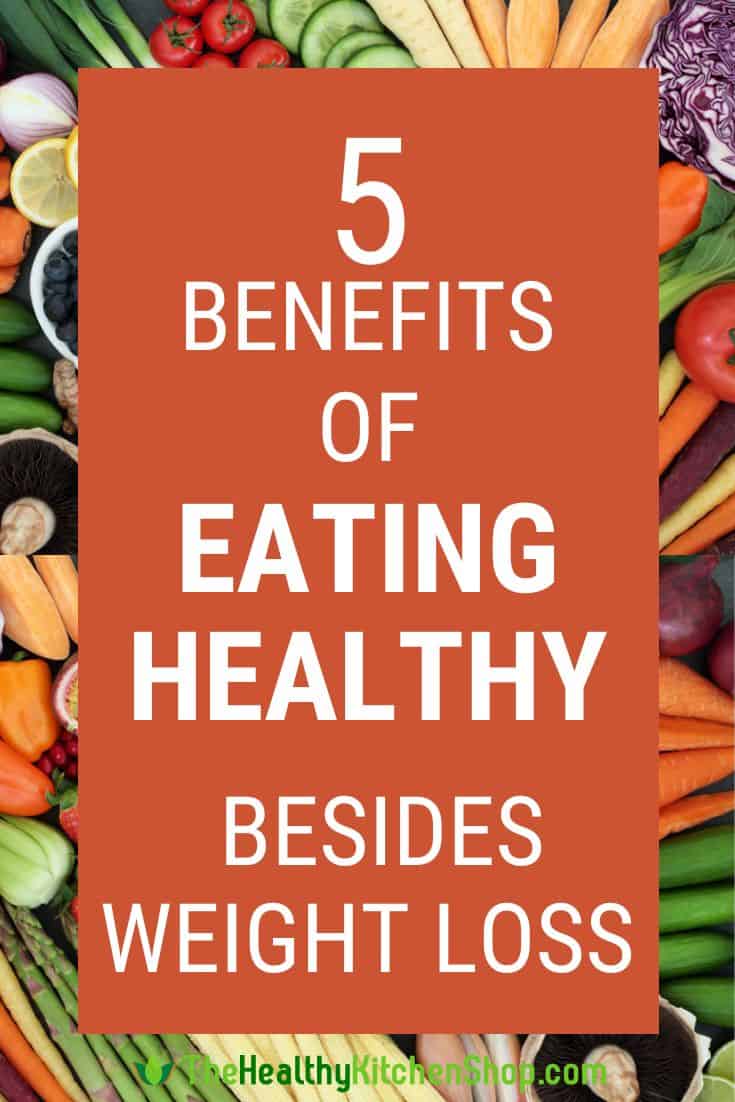
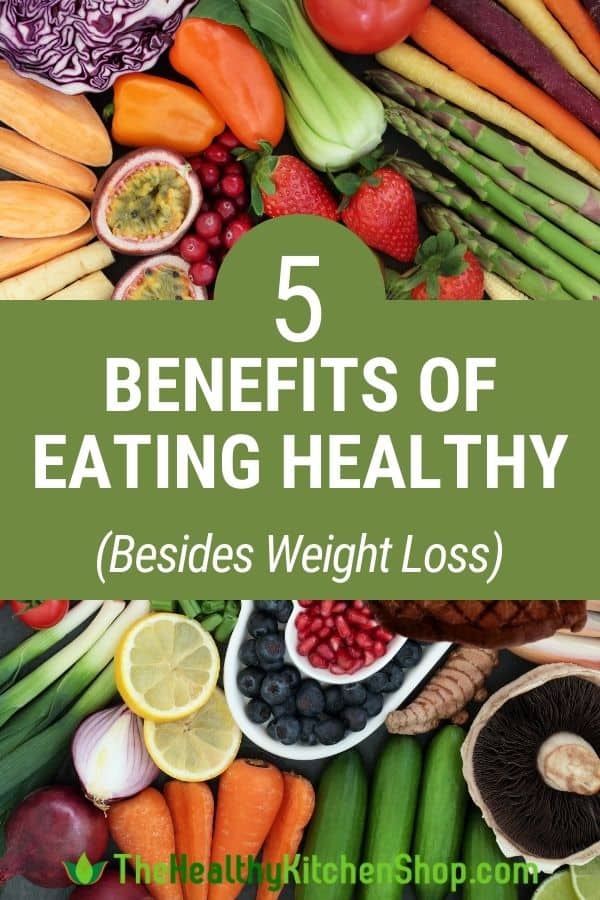
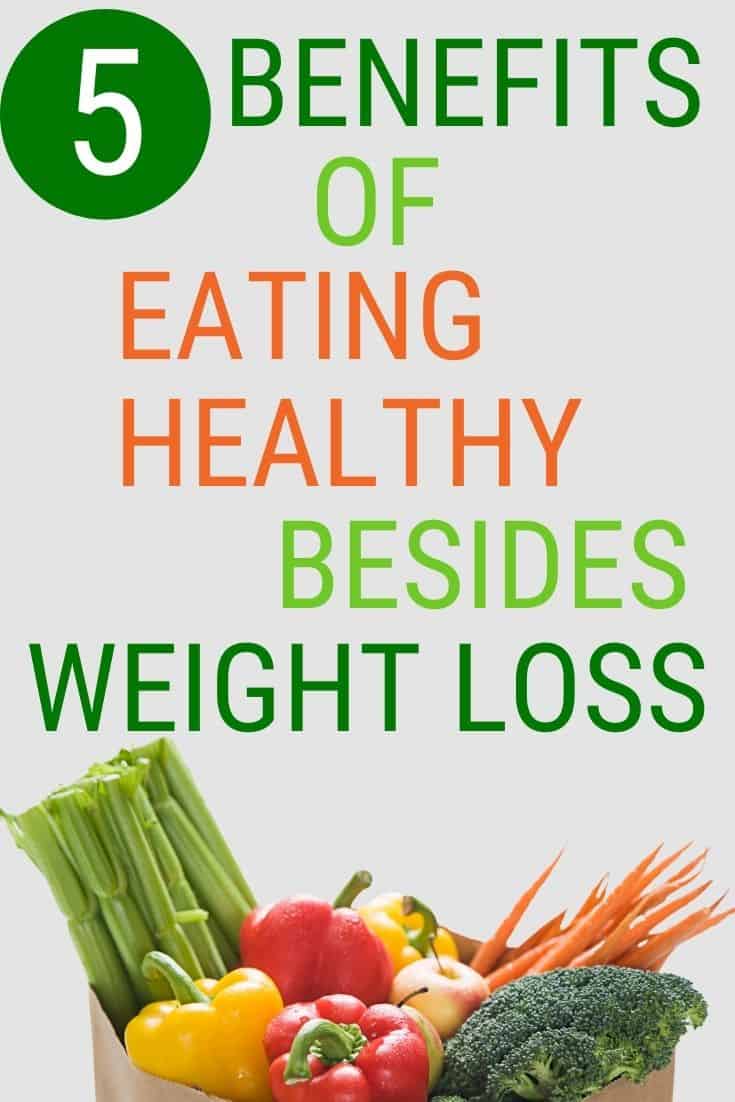
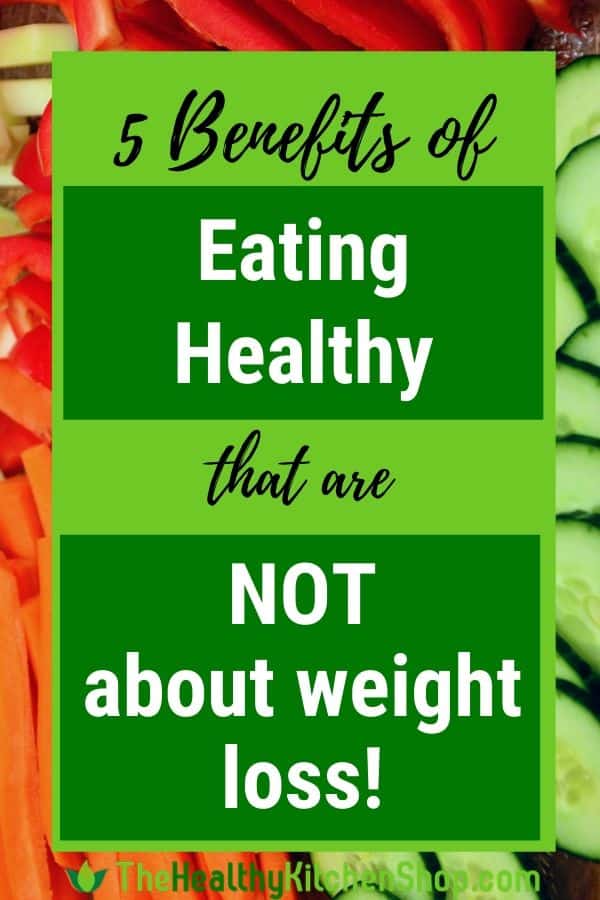
Eve Mitchell says
I had no idea that people who eat healthily are less likely to lose bone mass and muscle strength. I’ve been thinking about starting a healthier diet since my husband and I are trying to conceive. I think this will make me feel better, and be better for me if I end up being pregnant.